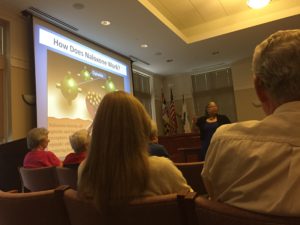
Improper use of Opioids and Heroin are a growing problem in the United States. Maryland’s Governor Larry Hogan believes it has reached a point of extreme crisis, recently declaring a state of emergency in Maryland, to start to fight against the use of Heroin and Opioid abuse throughout the state.
On Wednesday, June 7, 2017, as a member of the La Plata Police Crime Watch Committee, I had the opportunity to attend and receive my certification to administer NARCAN®, which the Maryland Department of Health and Hygiene describes as a prescription medication that safely and effectively reverses an opioid overdose.
The La Plata Crime Watch, the La Plata Police Department and members of the Charles County community came together to receive training and certification on an Opiate Overdose Reversal agent, Naloxone (NARCAN®, EVZIO®). Dr. Dianna Abney, Health Officer of the Charles County Department of Health, shared a power point presentation for the community on the healthy and non healthy uses of Opiates, what to look for in an overdose, how to respond, and how to administer NARCAN®, to a suspected victim of overdose.
At our training at the La Plata Town Hall, Dr. Abney reminded us to have compassion for our fellow neighbor. The person we help could be a brother or sister of ours in need of help, and if it’s not, it’s probably someone else’s family member or friend.
In Charles County, on June 21, 2017, the Charles County Government is hosting a free screening of Chasing the Dragon, a documentary about the struggle of addiction to opioids and heroin. After the movie, there will be an opportunity to receive training and ask questions.
The State of Maryland also has information on Naloxone use to reverse overdose due to opioids, find out more here.
To get help for you or a friend or family member who may be struggling with opioids contact Maryland’s Destination Recovery here or call 1-800-422-0009 for their crisis hotline.
Intersection of Maryland Workers’ Compensation and Personal Injury Cases and Opioids
It is common for people injured in a car crash or with a work injury to suffer from chronic pain. Often an injured worker or victim of a car crash is prescribed opioid medication at the hospital for a short period of time along with muscle relaxers to help with the sudden and increasing pain associated with their injuries. But when is prolonged use appropriate?
The American Academy for Pain Medicine states, “prescription for opioids for chronic, intractable pain is appropriate when more conservative methods are ineffective and the treatment plan is reasonably designed to avoid diversion, addiction and other adverse effects.
The reason why other conservative methods such as anti-inflammatories, physical therapy, aqua therapy, chiropractic care are sought first is because side effects of prolonged use of opioids are severe.
The Centers for Disease Control and Prevention lists the following risks:
In addition to the serious risks of addiction and overdose, the use of prescription opioid pain relievers can have a number of side effects, even when taken as directed:
- Tolerance—meaning you might need to take more of the medication for the same pain relief
- Physical dependence—meaning you have symptoms of withdrawal when the medication is stopped
- Increased sensitivity to pain
- Constipation
- Nausea, vomiting, and dry mouth
- Sleepiness and dizziness
- Confusion
- Depression
- Low levels of testosterone that can result in lower sex drive, energy, and strength
- Itching and sweating
As you progress through treatment and doctors talk to you about your chronic pain, keep in mind the risks involved in opioid use. Remember that it’s easy to become addicted. Athletes, injured workers and even doctors and nurses are often victims of opioid over use. You may be using opioids to try and mask the pain you are having. However, focusing on limiting the use of opioids is usually a wise decision. Keep an open dialogue with your family, your doctor and your attorney about your goals going forward.
For more information on appropriate Opioid use and help, review what the Center for Disease Control has published:
- https://www.cdc.gov/drugoverdose/awareness/recovery-month.html
If you, a family member or friend is struggling with injuries as a result of a car crash or a work injury, please call us for a legal consultation, we are here to help.












